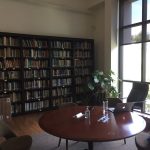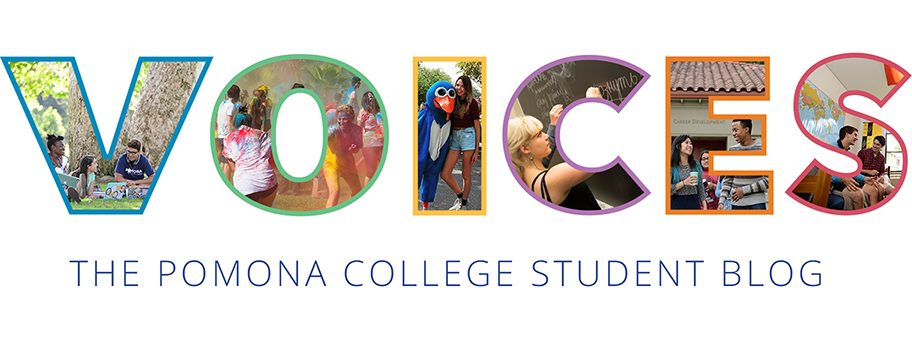By Sarah Binau ’19
I came to Pomona thinking I wanted to study Psychology, English, or History: the subjects I enjoyed in high school. I took an upper-division Psych class my first semester, having passed through the introductory course from an AP credit. I loved the class, and I liked the other Psych majors I met in the course. But, even though I loved it, I felt I was missing out on what I’d heard was the quintessential Liberal Arts experience: exploring new subjects and pushing your boundaries academically. This is too easy, I thought. Aren’t I supposed to pick a major that I never thought I’d do? Isn’t that the point of coming to a liberal arts school?
 My other favorite class that first semester was my first-year seminar (called ID1 at Pomona). Titled The Storytelling Animal, in it we explored explanations for the human propensity for narrative and storytelling, covering topics in psychology, philosophy, literature, and cognitive science.
My other favorite class that first semester was my first-year seminar (called ID1 at Pomona). Titled The Storytelling Animal, in it we explored explanations for the human propensity for narrative and storytelling, covering topics in psychology, philosophy, literature, and cognitive science.
Cognitive science… what is that? Brain science? I thought that was neuroscience? What’s the difference? Why are there so many fancy titles for the same thing? These thoughts stayed in the back of my head as we progressed throughout the semester. Cognitive Science seemed cool, but I had heard it wasn’t an engaging introductory course, so I dismissed the idea of taking it in the spring.
When selecting classes for my second semester, I signed up for an introductory Linguistics course instead. I had no idea what Linguistics actually was, but I figured my love for studying Spanish and my proclivity for grammar and usage in English were good reasons to sign up. Finally, I’m ‘exploring,’ like I should be, I thought.
The exploration proved crucial; that Linguistics class catalyzed the rest of my academic life here at Pomona. The material was riveting. I had no idea that Linguistics was so scientific, so technical, and was all about problem solving. I’ve been a singer for many years, and I had no idea there were scientific explanations for the different sounds and techniques I’d learned through my years in choirs, singing in various languages. I didn’t know you could chart vowels onto physical spaces in your mouth. I learned about language re-vitalization efforts, from Irish to the Lakota native peoples in the Dakotas. I learned about theories of grammar. I learned why you can say, “That is un-fucking-believable” or “That is un-be-fucking-lievable” but you can’t say “That is unbeliev-fucking-able.” (The explanation has to do with syllable stress!)

I thought about doing a double major in Linguistics and Psychology. But when I looked at the course load that would require, it filled my next three years at Pomona airtight. My ID1 professor, now my advisor, encouraged me to think more about Cognitive Science when I expressed my newfound interest in Linguistics. I learned that Cognitive Science is the study of the mind, assuming such a thing even exists. I learned that this encompasses everything from memory, to decision making, to language, to perception, to development of these different faculties. I learned that Pomona’s Cog Sci degree had Linguistics and Psychology requirements. I realized I had already completed three of them, without hardly trying. I learned that I’d also get Computer Science training through the major. It seemed to be the perfect fit––a blend of everything I had enjoyed thus far in my academic career. And it would require the same kind of thinking that I had exercised in that original ID1 class. And, most importantly, it would offer a lens through which I could approach the questions I’d been contemplating throughout that first Linguistics class: How do we learn this? How can all of this be going on if I didn’t know it was going on? How does my mind (and my brain) do that?

The summer after my first year, I played with the idea. I started telling people, experimentally, that I studied Cognitive Science. It felt good. I learned more about the history of Cognitive Science, and how uniquely it is tied to the development of computers. I learned about debates in the field, and between fields, that surround the incredibly complex and largely mysterious study of the mind. All of this exploration felt less like work and more like fun. Every new “bite” of information was interesting to me; I wanted to know more and connect it with what I already knew.
But what about my aspirations to study “the humanities?” My advisor again encouraged me to remember that STEM and the humanities do not, and should not, exist independently. Art and science are much closer than we think they are––and it is precisely that type of thinking that drew me to a college like Pomona in the first place. I wanted to be mentored by people who truly believe in the value of interdisciplinary studies. Cognitive Science has turned out to be an embodiment of that approach. This fall, I plan to write my thesis about Gillian Flynn’s novel Gone Girl. There you go: a scientific approach to literature.
In summary; if you head into college with a plan, don’t be afraid to let it flex. Build your own interdisciplinary world. Disciplines do not have to, and should not have to, act independently.
And take a Linguistics class.
